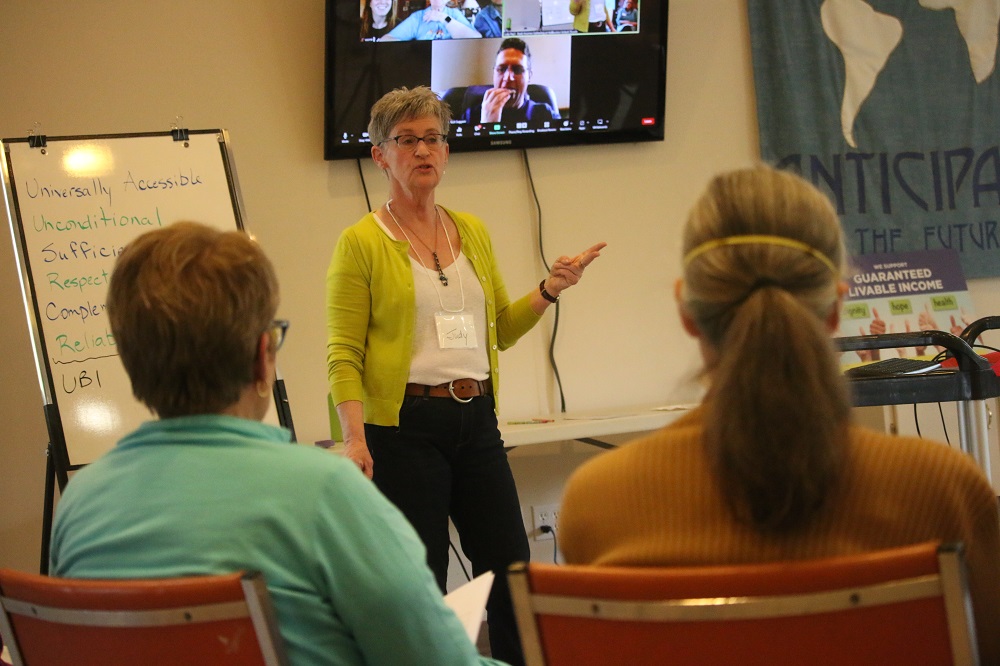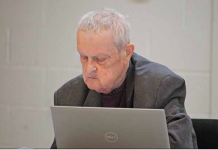Judy Paul is one of a handful of Highlanders trying to progress the idea of a universal basic income (UBI), believing it to be the key to eradicating poverty in one of Ontario’s hardest hit areas
Workshops in Minden in February and Haliburton May 10 attracted about 50 people and led to healthy discussion, Paul said, with most “quite supportive” of a UBI.
“In Canada, the rich are getting richer while the poor and middle class are stagnating. People are struggling and in a lot of cases they don’t know who to turn to, what to do,” Paul said. “Introducing a basic income can help so many people in so many ways – it can help women leave abusive relationships, it can help families put food on the table, inspire people to turn their lives around.”
The UBI concept has been around Canada for more than 50 years. A program, dubbed ‘Mincome’ was rolled out in Manitoba in the 1970s, replacing several family, youth and senior allowances for select families in Winnipeg and Dauphin. The program was jointly sponsored by the federal and provincial governments at a net cost of $645 million, running for four years before being scrapped.
Program costs pegged at $81B
Research in the decades since suggest the pilot was a success. Derek Hum and Wayne Simpson, then professors at the University of Manitoba, released a joint report in 1993 that found impacts to the labour supply were minimal. There was a reduction of one per cent of annual hours worked for men, three per cent for married women, and five per cent for unmarried women.
Health economist Evelyn Forget released a report in 2020, finding a reduction in hospitalizations due to accidents and injuries, fewer mental health diagnosis and an overall reduction in poverty.
The Dauphin and Winnipeg experiments were discussed at length by Paul at her workshops.
“That’s proof of concept that UBI works, it has a positive impact,” she said.
Haliburton County sits alongside Manitoulin Island as having the highest poverty rate in Ontario. According to statistics posted by the City of Kawartha Lakes Haliburton Poverty Reduction Roundtable, 17.2 per cent of the County’s population is considered low-income, while 18.5 per cent of children live in low-income households. Around half of the people who rent report spending more than 30 per cent of their income on shelter costs.
The Haliburton, Kawartha, Pine Ridge District Health Unit estimated in a 2022 report that 10.9 per cent of households across the region are considered food insecure.
Paul pointed to the pilot launched in Ontario in 2017, where 4,000 people from Lindsay, Thunder Bay, Hamilton, Brantford, and Brant County received benefits of $16,989 a year if they were single, and $24,027 a couple, as further validation a UBI can work.
A survey by the Basic Income Canada Network (BICN) in 2020 found the initiative, which was scrapped by the newly-elected Ford government in 2019, led to significant decrease in stress, anxiety and other mental health issues of participants. Respondents reported the basic income helped them better manage their work and home lives.
In 2022, the office of the parliamentary budget officer said a basic income like the one piloted in Ontario would cost $81 billion to roll out nationally, with a net cost of $45 billion if existing federal anti-poverty spending were re-directed toward the basic income. It was estimated more than 7.5 million people would qualify to receive the benefit.
‘Need in Highlands significant’
Susan Hubay leads a Peterborough-based chapter of Coalition Canada, a group committed to advocating for basic income. Speaking with The Highlander, she said she’s encountered a lot of County residents in the eight years she’s spent working on the file, noting the need in the Highlands is “significant.”
“People cannot reach their potential if they’re struggling every day trying to keep food on the table or a roof over their head. We need something in Canada that covers those basic needs,” Hubay said. “We’re looking for a guaranteed income that will put people over the poverty line.”
A living wage in the County was pegged at $19.05 by HKPR in 2020, which works out to just over $37,000 per year on a full-time schedule.
Paul shared details of a report compiled by the BICN in 2021 that outlines three potential scenarios for UBI rollout. The first would see adults aged 18 to 64 qualify for a maximum of $22,000 per year if single, or $31,114 a couple, based on other earnings, at a cost of $134 billion.
The second would see all adults qualify for those amounts, at a cost of $187 billion. Option three would feature a universal benefit for all adults over the age of 18, receiving $22,000 regardless of family status or other income. This model would run $637 billion annually.
The authors, Chandra Pasma, an MPP in Ottawa West-Nepean, and Sheila Regehr, executive director of the National Council of Welfare, said the lowest income families would see their disposable income increase by more than 350 per cent, with poverty being almost eliminated.
Hubay said any UBI program would need to be a joint venture between the federal and provincial governments.
Haliburton-Kawartha Lakes-Brock MP Jamie Schmale doesn’t believe UBI is the answer.
“Canada is over $1 trillion in debt. Canada doesn’t have a lot of fiscal room… so the issue is, where are you getting the money from to pay for this?” he asked. “I’m open to supporting anything that will make the lives of people in the riding better, but there has to be a significant plan to [move forward] with something like that.”
Paul said she’s committed to the fight and is considering launching a Haliburton-based UBI group.





